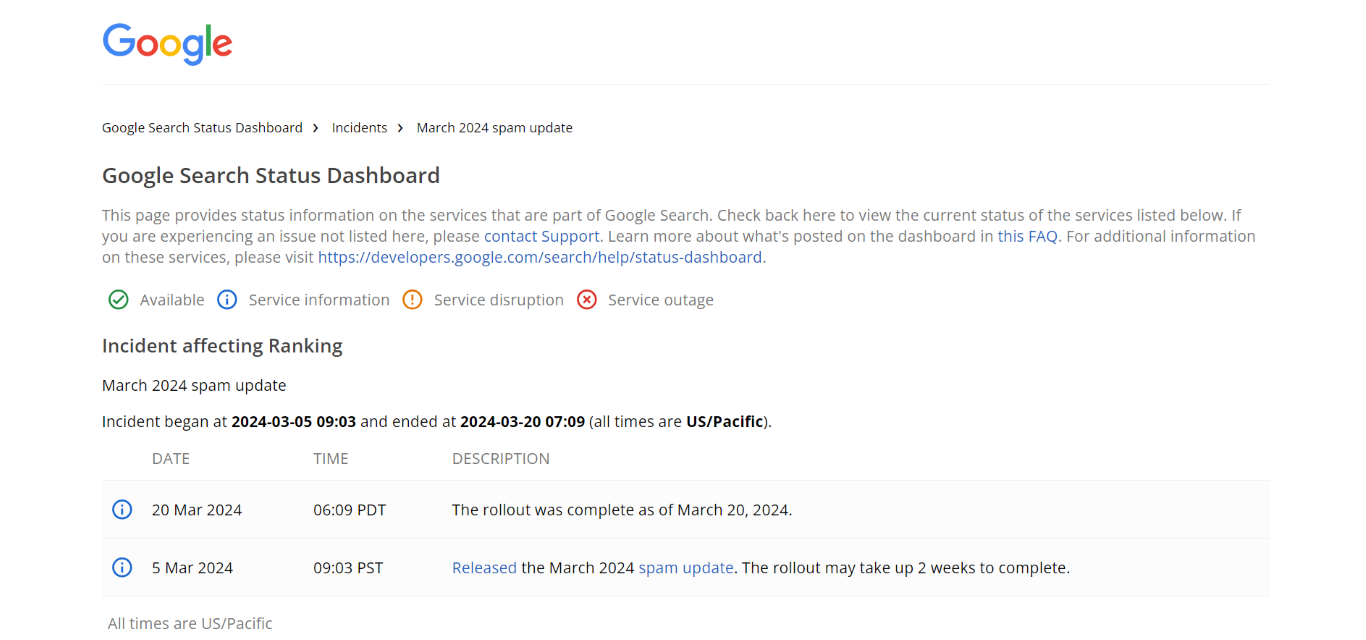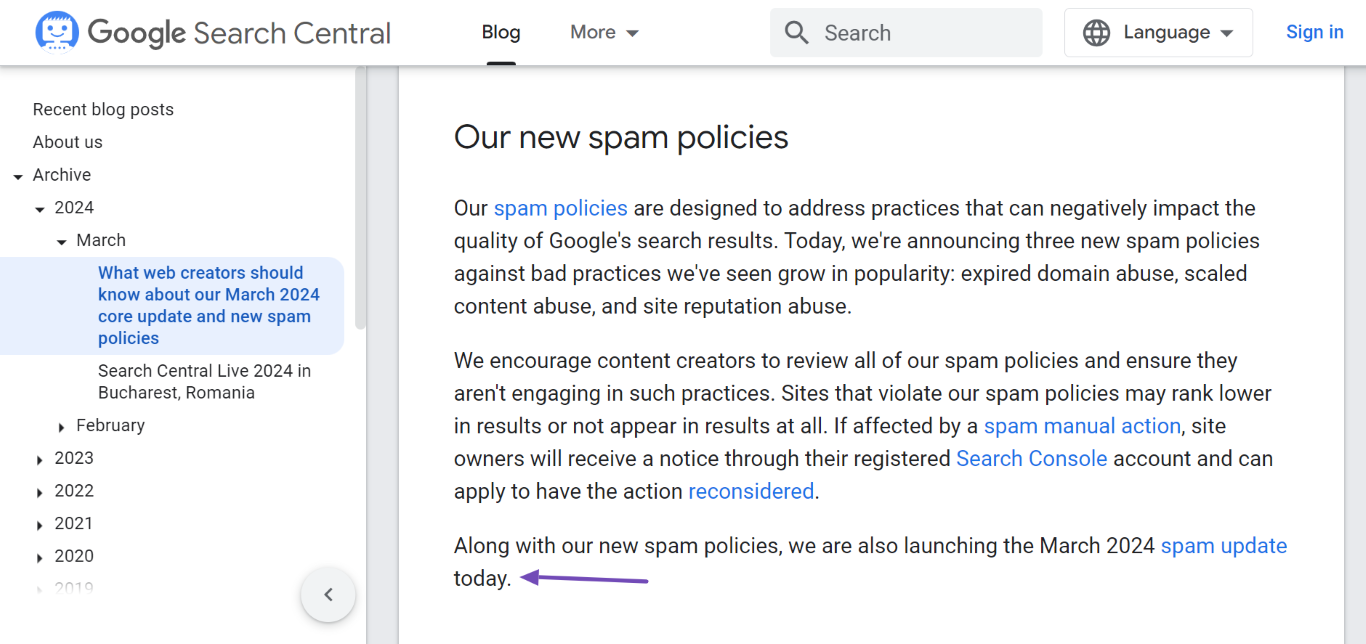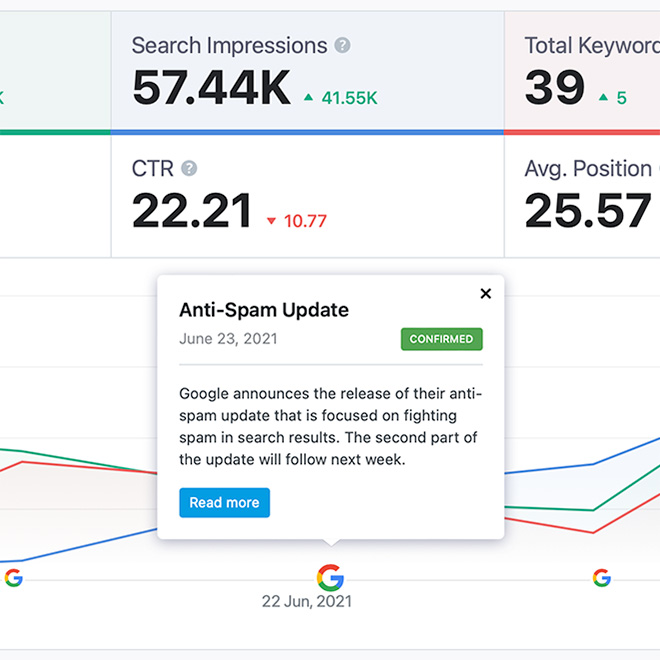Google rolled out an update to its spam detection system on March 5, 2024. It was released alongside an update to Google’s spam policies and the March 2024 Core Update, and was completed on March 20, 2024.

Google’s Official Announcement
Google announced the March 2024 spam update in the same document, which announced the spam policy update and the March 2024 core update.

The spam policy update includes three new additions to Google spam policies.
- Expired domain abuse
- Scaled content abuse
- Site reputation abuse
Expired Domain Abuse: This update targets site owners who purchase expired domains and populate them with low-quality content to manipulate search results. For example, low-quality casino-related content published on a domain that previously contained a medical site.
Scaled Content Abuse: This update targets site owners who create multiple unhelpful pages that provide little to no value to the visitor and are intended to manipulate search rankings. For example, unhelpful content created by humans, AI, or a combination of humans and AI.
Site Reputation Abuse: This update targets sites that publish third-party content that is intended to manipulate search rankings. For example, third-party advertising content intended to attract traffic from search results pages.
While the other spam policies went live immediately, the site reputation abuse update is expected to go live on May 5, 2024, to allow site owners enough time to prepare.
What Are People Saying?
On X (formerly Twitter), Glenn Gabe mentioned that the March 2024 Spam Update and the spam policies update will affect sites that mass-generate low-value, unhelpful content using AI, humans, or a combination of AI and humans.
Even more: And beyond all of that, Google is also rolling out March 2024 spam updates with spam policy updates too. These will yield both algorithmic and manual actions. First, there's "scaled content abuse search spam", which is an update to the "spammy automatically-generated… pic.twitter.com/gyUS5W8gcd
— Glenn Gabe (@glenngabe) March 5, 2024
Meanwhile, SEOs began observing the effect of the spam policy update within a day of its release. In another post, Glenn mentioned he had received complaints from site owners whose sites had been deindexed.
Although we're waiting for the March 2024 core update to land (soon), it looks like Google has not waited on the manual action front based on the spam policy updates it announced yesterday. I've already had multiple people ping me about sites being completely deindexed. And those… pic.twitter.com/VBZMaSwSww
— Glenn Gabe (@glenngabe) March 6, 2024
Jeff Coyle also noted that many low-quality spam sites created within the last two years had disappeared entirely from search results. This includes sites that survived previous spam updates.
I was checking out a pool of SERPs I monitor for a collection of horrible spam sites that have been present and creeping around for 12-18 months. Many are completely deindexed, and others are hidden in filter=0 or literally bunched up at the bottom (the actual bottom, like the… pic.twitter.com/Su2gpIoH8z
— Jeff Coyle (@jeffrey_coyle) March 6, 2024
Bruno Dangelo also reported that spam sites with hundreds of thousands of traffic (or even millions in some cases) disappeared overnight.
🔥 10 Sitios totalmente desindexados en #Google, solo algunos de los que encontré haciendo algunas revisiones:
🔴 equityatlas .org [4M – 900k]
🔴 filmifeed .com [1M – 850k]
🔴 qmunicatemagazine .com [750k – 680k]
🔴 newsunzip .com [400k – 290k]
🔴 tvguidetime .com [300k – 770k]… pic.twitter.com/ZJ4KQo0ElE— Bruno Dangelo (@porteseo) March 6, 2024
Charles Floate also posted a thread with examples of sites that were deindexed from Google Search results for publishing pure spam.
Site #22 – Hnbgu pic.twitter.com/QnF8JwokAl
— Charles Floate 📈 (@Charles_SEO) March 8, 2024
Gael Breton also reported that spam sites created using AI were being deindexed on a large scale.
I’m seeing AI spam sites getting fully deindexed left and right right now.
It’s going to get interesting
— Gael Breton (@GaelBreton) March 6, 2024
Also, Google has been inconsistent in the method through which it informs site owners that a manual action has been applied to their site. Only a few sites received email notifications. The rest received a message in their Search Console after suffering a massive drop in traffic.
I've been brought on to help some sites after they realilzed that they had a manual action. Looking at the data, most had a significant decline before the MA should up in thier GSC. A few recieved an email.
— Jeannie Hill (@essentialskill) March 6, 2024
Tony Hill also shared similar insights, saying the site owners he spoke with did not receive any email informing them of the manual action.
Good question. Everyone I've asked who got the manual action said they did not get an email notification about it 🤔
— Tony Hill (@tonythill) March 6, 2024
Ollie Ryman also observed that sites that engage in abusive experiences, such as ads that trick visitors into clicking them and sites that auto-direct visitors to other pages, didn’t receive a manual action message in Search Console even though they were hit with a manual action.
Yes, for some things you need to have the individual site listed in Search Console. If you have the domain verified, you can just add the site without extra work. Very few features in Search Console are like that currently (that one is a bit older – 2018?).
— John (@JohnMu) March 6, 2024
With that said, the spam policies update is believed to have mostly affected sites that generate low-quality spammy content using AI. Glenn Gabe posted about an Originality.ai study that revealed the affected sites had considerable AI content.
https://t.co/gjjF7oBKee Study: 1,446 websites had a manual action applied to them out of 79k websites checked in March 2024 (based on the Spam Update and the spam policy updates announced the other day)
Originality also checked for AI content on some of the sites deindexed. They… pic.twitter.com/qsojB25MiP
— Glenn Gabe (@glenngabe) March 7, 2024
Craig Griffiths suggested that Google identified these sites based on the large amount of content they published within short periods of time. However, Pete Reynolds replied, saying his one-year-old site was also deindexed, even though it only had eight AI-generated content.
I have a site that has just 8 articles on it, published one year ago. Was 100% AI, and just intended to warm up the domain in case I ever wanted to pursue the project.
It's the only site in my portfolio that has got the manual action.
— Pete Reynolds (@PeteReynolds_) March 6, 2024
Another SEO, Simranpal Singh, mentioned that a site he created in 2013 was issued a manual penalty even though it contained no AI content.
Even one of our websites got hit with a manual penalty.
I started it in 2013, a brand new domain, that ranked well and was receiving good traffic over the years. Today I got a manual penalty for it.No Spam, Articles written by trusted authors, everything from screenshots to…
— Simranpal Singh (ਸਿਮਰਨਪਾਲ ਸਿੰਘ) (@simransingh931) March 6, 2024
Previous Spam Updates
The March 2024 Spam Update is one of the many spam updates we have reported since 2021. Below are details of the other spam updates we have documented so far.
- October 2023 Spam Update: October 4 – October 20, 2023
- December 2022 Link Spam Update: December 14, 2022 – January 12, 2023
- October 2022 Spam Update: October 19 – October 21, 2022
- November 2021 Anti-Spam Update: November 3 – November 11, 2021
- Link Spam Update: July 26 – August 24, 2021
- Anti-Spam Update II: June 29, 2021
- Anti-Spam Update: June 23, 2021
What’s Next – Dealing With This Update
Spam updates are typically nothing to worry about as long as you comply with Google Search Essentials. However, you should review your content to ensure they comply with the updated spam policies, particularly the site reputation abuse update that will go live on May 5, 2024.
You should also monitor your site with Rank Math Analytics, as this spam update ran alongside the March 2024 Core Update. If you observe any traffic drop at the time of the update, follow the guide below to identify which update affected your site.
How to Identify Which Update Affected Your Site
Once you identify a drop in your traffic, check your Google Search Console dashboard and the email registered to your Google Search Console for a manual actions notification. Bear in mind that the notification may be sent to one and not the other. It may also arrive hours after the traffic loss.
- If you received a manual action notification, then the Spam Update caused your traffic loss
- If you didn’t receive a manual action notification, and your site remains indexed in Google, then the Core Update caused your traffic loss
If you were affected by the Spam Update, remove any spam content on your site and watch the video below for tips on recovering from a Google algorithm update.
Frequently Asked Questions
Google may issue a pure spam manual action if it detects aggressive spam tactics. Here are some common questions and answers about manual actions:
1) Will Google remove the manual action if I remove some spam pages?
No, you must remove all spam pages from your site before Google will consider removing the manual action.
2) Should I remove the rel=canonical tag if Google identifies another page as canonical?
You should maintain your canonical tags based on your site’s content and structure. When a manual action is issued, focus on removing or correcting the spam content rather than altering the canonical tag.
3) Will I regain my rankings when I remove the spam pages?
Your site may take some time to recover its rankings. In the meantime, continue creating high-quality content and adhere to Google’s best practices.
4) Should I abandon my site and create a new one after receiving a manual action penalty?
The damage to your domain may be reversible. Remove the spam content and request a review to have the manual actions penalty lifted. Ensure that you follow search engine guidelines afterward.
5) Why was my site deindexed while other spam sites were left alone?
Google is always on the lookout for spammy sites. While some may evade a manual action now, it is not guaranteed that they will not be identified and issued one in the future.
6) Why did I lose traffic despite not being issued a manual action penalty?
Traffic loss can occur for various reasons, including technical SEO issues or a Google algorithm update. If you weren’t issued a manual action penalty, audit your site to identify why you lost traffic.
